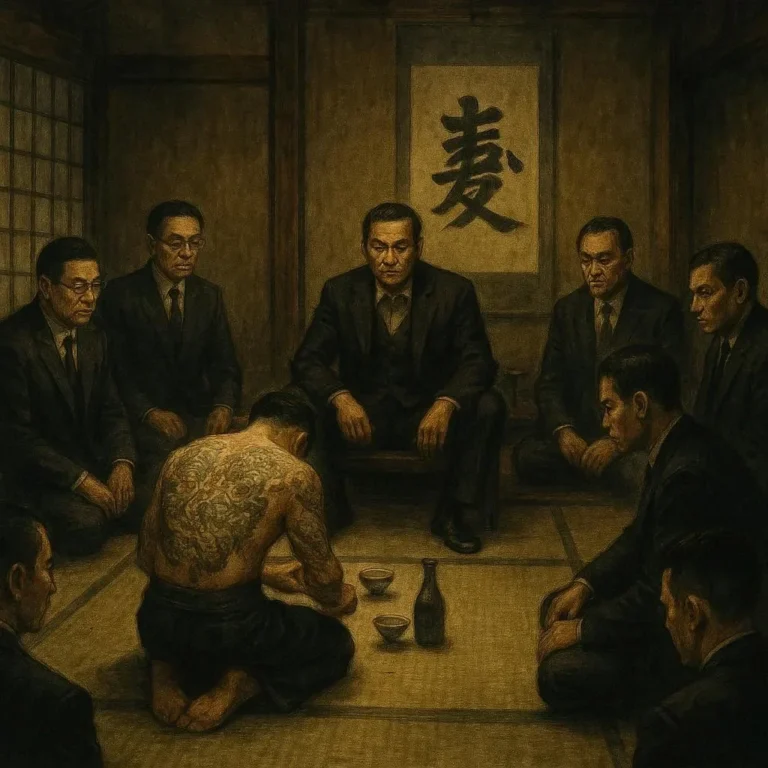504 views The Psychological Makeup of a Yakuza Member
The Psychology Behind the Yakuza: Loyalty, Honor, and the Modern Mindset
The Yakuza, Japan’s infamous organized crime syndicates, have long fascinated the world with their intricate hierarchies, strict codes of conduct, and mysterious rituals. While much attention is paid to their criminal activities, the psychological makeup of a Yakuza member remains a topic of intrigue. What drives individuals to join such organizations? What psychological traits define them? This blog post delves into the psyche of Yakuza members, exploring their motivations, beliefs, and the cultural factors that shape their mindset.
The Allure of the Yakuza: Why Men Join
The Yakuza, also known as boryokudan or gokudō, have a history that dates back to the 17th century. Originally formed as gambling rings and peddlers’ associations, these groups evolved into the complex criminal entities we know today. Despite their involvement in illegal activities, the Yakuza often portray themselves as modern-day samurai, adhering to a strict code of honor and loyalty known as giri ninjō.
So, why do men join the Yakuza? For many, it’s a combination of economic necessity, a desire for belonging, and the allure of power. In Japan’s highly competitive society, where unemployment and social exclusion can lead to marginalization, the Yakuza offers a sense of purpose and identity. New recruits often come from disadvantaged backgrounds, where they feel a lack of opportunities and acceptance.
The Yakuza’s emphasis on giri (obligation) and ninjō (passion) creates a strong psychological bond among members. This code of honor is deeply ingrained in their culture, often supplanting traditional family ties. For those who feel adrift in society, the Yakuza provides a surrogate family and a clear hierarchy to navigate.
The Initiation Rites: A Psychological Entrance into the Yakuza
The initiation into the Yakuza is a ritualistic process designed to test a recruit’s commitment and loyalty. One of the most well-known rites is the sabyte ceremony, where the recruit’s finger is cut with a knife, and he is expected to endure the pain without flinching. This act of self-mutilation symbolizes the individual’s willingness to sacrifice for the organization.
Beyond physical endurance, the initiation process reinforces psychological submission to the group. Members must adopt a subservient attitude toward their superiors, often referring to them as oyabun (father figure) and addressing them with honorific language. This hierarchical structure creates a mindset of deference and loyalty, which is crucial for maintaining order within the organization.
The psychological impact of these initiation rites cannot be overstated. They create a sense of isolation from mainstream society and a deep sense of belonging to the Yakuza. Once a member, it’s nearly impossible to leave without severe consequences, a reality that further solidifies their psychological commitment.
The Role of Tattoos: A Visual Representation of Loyalty
Tattoos play a significant role in the psychological makeup of a Yakuza member. These intricate designs, often covering large parts of the body, are more than just decorative; they are a visual testament to a member’s dedication and status within the organization.
The process of getting a Yakuza tattoo, known as irezumi, is a painful and time-consuming ordeal. The tattoos are often done by hand using traditional methods, a practice that further emphasizes the member’s endurance and willingness to suffer for the group. The designs themselves typically feature motifs like dragons, phoenixes, and cherry blossoms, which symbolize strength, rebirth, and the fleeting nature of life.
The psychological impact of these tattoos is twofold. Firstly, they serve as a constant reminder of the member’s allegiance to the Yakuza, reinforcing their identity and commitment. Secondly, they act as a visible marker that distinguishes them from the rest of society, further reinforcing their separation from mainstream culture.
The Hierarchy and Its Psychological Implications
The Yakuza’s hierarchical structure is one of the most defining aspects of their psychological makeup. At the top of the pyramid is the oyabun, the father figure who holds absolute authority over the group. Below him are the wakagashira (lieutenants), and then the shateigashira (clique leaders). At the bottom are the * kobun* (child figures), the newest and most junior members.
This strict hierarchy creates a psychological dynamic of submission and dominance. Members are expected to show unwavering respect to their superiors, often through acts of obeisance and deference. This structure not only reinforces loyalty but also fosters a mindset of discipline and control.
The psychological impact of this hierarchy is profound. It creates a sense of stability and order within the organization, allowing members to function within a clear framework of roles and responsibilities. However, it also perpetuates a culture of fear and submission, where challenging authority is unthinkable.
The Modern Psychology of the Yakuza
While the Yakuza’s core values of loyalty and honor remain unchanged, the modern era has brought new challenges to their psychological makeup. With increasing police crackdowns and the rise of international organized crime, the Yakuza has had to adapt to stay relevant.
One of the most significant changes in recent years is the decline in recruitment. As Japan’s economy has grown, fewer young men are drawn to the Yakuza’s promises of protection and belonging. Additionally, the stigma associated with being a Yakuza member has increased, making it harder for the organization to attract new recruits.
Despite these challenges, the Yakuza’s psychological grip on its members remains strong. The sense of belonging and purpose that they provide continues to be a powerful draw for those who feel marginalized or excluded from mainstream society. However, the organization’s ability to adapt to the changing times will play a crucial role in its survival.
The Psychology of Loyalty and Betrayal
Loyalty is the cornerstone of the Yakuza’s psychological makeup. Members are expected to place the organization above all else, including family and personal interests. Betrayal is punishable by death, a reality that reinforces the psychological bonds of loyalty and fear.
The psychological impact of this unwavering loyalty cannot be overstated. It creates a mindset of single-minded devotion, where the needs of the individual are subordinated to the needs of the group. This loyalty is further reinforced by the Yakuza’s emphasis on honor and reputation, where any perceived slight or betrayal is seen as a direct attack on the organization’s integrity.
However, this strict code of loyalty also creates a culture of mistrust and paranoia. Members are constantly on guard against potential threats, both from within and outside the organization. This tension between loyalty and mistrust is a defining aspect of the Yakuza’s psychological landscape.
Conclusion: The Enduring Allure of the Yakuza
The psychological makeup of a Yakuza member is a complex web of loyalty, honor, and sacrifice. While their activities are undeniably criminal, the underlying motivations and beliefs that drive them are deeply rooted in a unique cultural and psychological framework.
As we continue to study and understand the Yakuza, it’s important to approach the topic with nuance and objectivity. By exploring their psychological makeup, we can gain a deeper insight into the cultural and societal factors that shape their behavior.
This exploration also raises broader questions about the nature of loyalty, honor, and identity in organized crime. As the Yakuza continues to evolve in the modern era, it will be fascinating to see how their psychological makeup adapts to the challenges of the 21st century.
For those interested in learning more about the Yakuza and their psychological dynamics, there are a wealth of resources available. From historical analyses to modern psychological studies, there’s no shortage of material to explore. Whether you’re a student of criminology, a psychologist, or simply someone with a curiosity about the Yakuza, there’s much to uncover.
So, take the next step in your journey of discovery. Explore the fascinating world of the Yakuza, and uncover the psychological forces that drive these enigmatic individuals.
This concludes our exploration of the psychological makeup of a Yakuza member. We hope you found this deep dive into the mindset and motivations of these fascinating individuals both informative and engaging. For more insights into the world of organized crime and psychology, be sure to check out our related content.
If you have any questions or comments about this article, we’d love to hear from you. Please feel free to share your thoughts in the comments section below. And if you enjoyed this post, don’t forget to share it with others who might find it equally fascinating.
Learn more about the Yakuza and their history.






